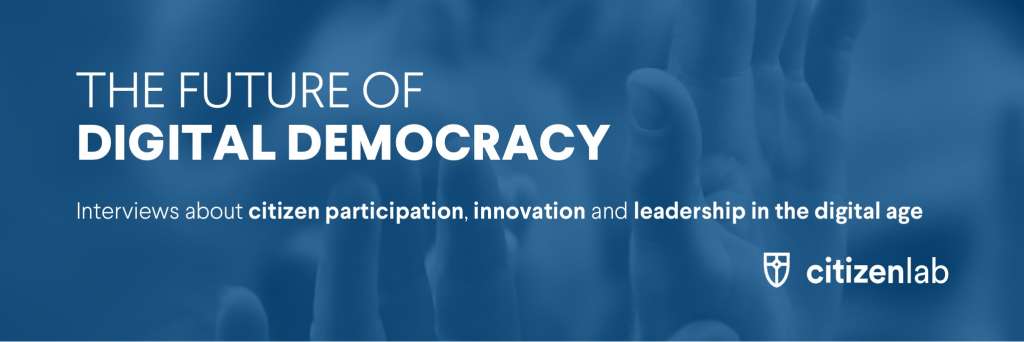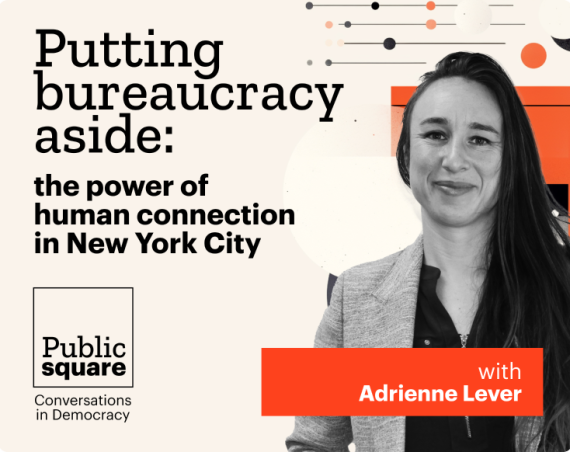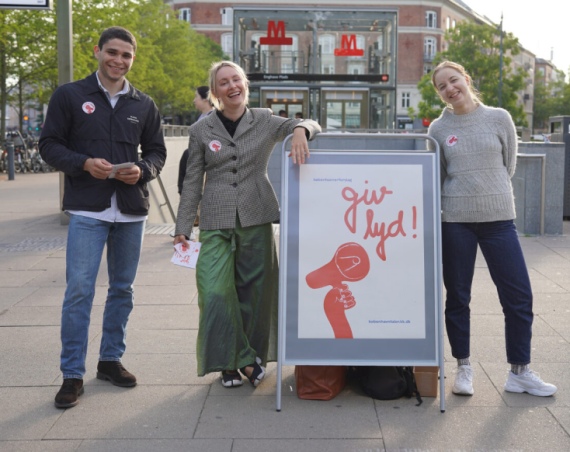This interview is part of a series of 12 expert interviews on the future of digital democracy. You can read the full white paper with interviews here.

Adriana Groh is the director of the Prototype Fund, a Berlin-based organisation which funds innovative, citizen-led projects which benefit the public interest. Adriana has a background in political science and sociology, combined with a passion for democratic innovation. Before joining the Prototype Fund, she launched Wepublic – an app to allow voters in the 2017 German general election to communicate with political parties and crowdsource interesting questions.
CitizenLab – “Can you tell us about Public Interest Tech, what it means and why it matters today?”
Adriana Groh – “Public Interest Tech is an idea that comes from the United States. In the 1960s, law students in Ivy League universities started a movement called Public Interest Law: instead of joining corporate law-firms right after graduation, some of them pledged to use their skills for the public good and to start off their careers in public institutions. In recent years, this idea has taken root amongst coders and engineers. These profiles have extremely valuable skills, and can make a hugely positive impact by working for a few years in public institutions, think-tanks or NGOs.
The idea behind Public Interest Tech is to humanise the technologists (making it clear to them why their skills are needed for the public good), and also to technologise the humanists (helping the government acquire the skills it needs to adapt and innovate). It’s also about openness: open resources that are free to use for everyone who wants to contribute to open knowledge and use their skills for the public good.
The Prototype Fund supports projects which are aiming to improve the public good. The “Public Interest Tech” framework allows us to cluster many different technologies under one umbrella. They’re all open source, participatory and sustainable, meaning they can be modelled, used, and adapted by other people. More importantly, they’re all aiming to enhance the public good.”
Public Interest Tech has the power to break the barriers we’ve built between Civic Tech and GovTech.
Adriana Groh
C – “So… what is the public good?”
AG – “That’s a question we get very often! Today, there’s no clear-cut definition that everyone agrees on. It’s difficult to define the notion of public good: it’s always evolving and can be approached from many different angles. You could say a project of public interest is something which benefits a societal group without disadvantaging another group; you could also define it as something which improves equality, sustainability or wealth distribution. In the case of the Prototype Fund, we’ve decided to go with a narrower and measurable definition of Public Interest. The projects we fund have to address a specific issue of importance for a specific societal group: it could, for instance, be technology to help deaf people, or to improve public commuting within a certain geographical area.”
C – “It’s often said that whilst Civic Tech is about increasing the legitimacy of governments, GovTech is about improving efficiency. Is Public Interest Tech about striking a balance between these two notions?”
AG – “There’s currently a very clear-cut division between Civic Tech and GovTech. They are funded differently, structured differently and rely on different legal principles. However, it’s not necessarily helpful to have these divisions – neither notion was sufficient enough to define the projects that we want to fund at the Prototype Fund. Public Interest Tech is wider than Civic Tech or GovTech, and it has the potential to break the barriers we’ve created between these two notions. Combining Civic Tech and GovTech allows us to think about infrastructure and security alongside questions of efficiency and legitimacy, which helps us take innovations further.”
C – “Governments need to innovate to respond to 21st century challenges. Where should this push come from: the private sector, or governments themselves?”
AG – “Both! The private sector needs to be innovative to secure business models or come up with new ones, and it is often easier for private companies to afford new talents and start new projects and experiments. The public sector has a different responsibility and faces the challenge to be innovative in strict, long time established, hierarchical systems. Yet at the same time, the public sector made the high-risk investments that made many innovations possible in the first place! The private sector often only finds the courage to invest after a government funded the research and groundwork. We need to join forces and combine the different strengths from inside and outside government to come up with groundbreaking innovation!”
Democracy isn’t about who is the loudest or the sharpest.
Adriana Groh
C – “Do you think that the current algorithms which give more traction to people who are the loudest are a threat to modern democracy?”
AG – “The platforms that we use for online communication are marketing platforms. They work brilliantly for marketing logic, but democracy isn’t about who’s the loudest or who’s the sharpest, so there’s a fundamental inadequacy there. Although I’m hesitant to say of much of an impact it has on the individual level, I do think it is a threat because it allows manipulation on a way bigger scale, in a more specific and more personal way than we’ve ever seen before.
Populist movements and disinformation have always existed alongside democracy, but we’d never had tools to make these as efficient as they are today – and this is where the problem lies. We don’t need marketing platforms that have been designed to sell products – we need to come up with tools that allow us to form informed opinions and engage in meaningful conversations.
C – “What trends would you like to see in Public Interest Tech in the coming years?”
AG – “I personally hope to see more open technology about respectful data collection – tools which give users better ownership of their data and allow them to choose what they disclose.
There’s also currently a lot of talk about sovereignty or sustainability, and about a European way of internet. I would like to see a counter-model to the Silicon Valley or surveillance models we see coming from other parts of the world. I think we need a more clear-cut vision of what the internet should be, and we should be ready to invest in open source, open standards and open data.”
This conversation is part of a series of 12 expert interviews on the future of digital democracy. You can read the full white paper here.






